COVID-19 isn't a setback for HP's sustainability goals — it's a catalyst
For HP's president of personal systems, Alex Cho, the urgency of the pandemic underscores the consequences of an increasingly interconnected world.
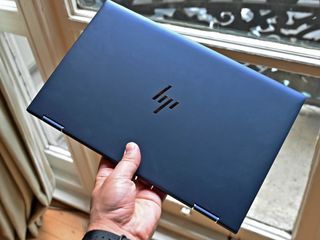
As the specter of climate change looms over everything from conservation to politics, its current effects — and those we have yet to experience — are coming into sharp relief around the world. An eight-country poll conducted last year showed that climate breakdown was viewed as "the most important issue facing the world" for a majority of those surveyed. Companies, too, have been more vocal in their efforts to operate in an environmentally conscious way, particularly among those in the tech industry.
However, the COVID-19 pandemic has thrown a spanner in the works for many companies this year as the world copes with not only the human toll, but lockdowns, layoffs, and a massive shift to remote work for those fortunate enough to do so. With so much uncertainty in the air, it wouldn't come as a surprise to hear about companies de-prioritizing their sustainability efforts to focus spending in other, more business-critical areas.
For HP, though, sustainability remains a key pillar of its approach to business. I recently spoke with HP's president of personal systems, Alex Cho, to get a feel for how the company is juggling its sustainability goals amidst a global pandemic and how its environmental initiatives figure into its future portfolio.
Planetary priorities in a pandemic
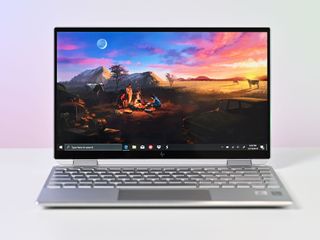
HP, like many businesses, saw the COVID outbreak as an inflection point. The virus laid bare the interconnected nature of the world, and the shift to remote work made PCs more important than ever. To Cho, this made apparent that PCs are "becoming essential."
"We're not working without a PC, we're not learning without a PC," Cho said. "So what you see is we're right in the middle of something that's difficult and what we're working on is increasingly essential, and it's pretty motivating."
"Being a part of something bigger ... we find that very motivating."
Rather than putting a pause on sustainability, Cho said COVID has served as a "catalyst" for HP to double down on its sustainability goals. "How do we make sure we're delivering on our greater ambition of helping people stay productive, connected, learning, and secure, and how do we do that in a sustainable way?"
It's a mission that HP is well prepared to carry out. In May, HP announced that it had the "world's most sustainable PC portfolio, as measured by EPEAT, a program that independently verifies companies' sustainability claims. EPEAT's ecolabel criteria measure things like energy efficiency, product longevity, packaging, and material usage. At the time, HP said it had 38 Gold and 268 Silver EPEAT-registered products, which outpaced all others in the IT industry.
Get the Windows Central Newsletter
All the latest news, reviews, and guides for Windows and Xbox diehards.
"We're actually getting more assertive about this because we've been at it and it's tough, but we just think it's the right thing to do," Cho said. "This is a time where people are evaluating what they're doing in their day jobs, and being a part of something that's bigger, that's going to make an impact, that's helping people, we just find that very motivating."
An 80-year journey
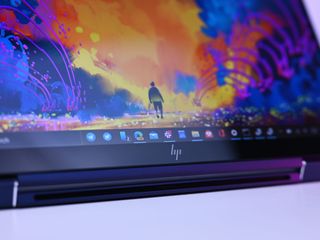
You'd be forgiven if HP isn't the first company that comes to mind when you think of sustainability. The company is an old name in the PC industry, and its origins date back even further to 1939, when Bill Hewlett and David Packard founded The Hewlett-Packard Company in a Palo Alto garage. It's not exactly the hip, new kid on the block.
However, HP has a legacy of environmental initiatives. In 1966, for example, HP emplyee Walt Moy started a recycling program for HP punch cards. It seems quaint now, but it was the start of an increasing push for environmental initiatives.
Through the 1980s, HP made it a priority to focus on controlling pollution in its operations, and it set up its own hardware recycling program in 1987. By 2019, HP had announced several initiatives to use ocean-bound plastic in manufacturing, pledged to reach 100 percent renewable electricity in its operations by 2035, and set goals to to help suppliers drastically cut carbon emissions.
In a time in which it feels trendy for corporations to tout their sustainability goals, it's easy to remain skeptical of their claims. We're frequently bombarded with print ads and commercials that often feel like lip service to the climate crisis. Despite this, HP is now ranked as one of the world's most sustainable companies, earning recognition for its environmental and social impact.
Still, for Cho, HP has a long road ahead of it. "We have concrete proof points of progress, and I will tell you, genuinely, it has taken a lot of investment," he said. "And I would say we've got a lot more to grow and go."
Maintaining momentum
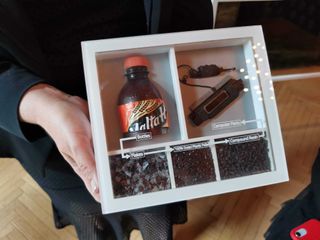
Going forward, HP has its sights set on several areas of improvement for its PCs and accessories. This year, the company launched the HP Elite Dragonfly and EliteDisplay E273d monitor, both of which are manufactured using ocean-bound plastic. Those aren't one-off flukes, either: All of HP's new Elite and Pro desktops and notebooks released in 2020 incorporate ocean-bound plastics as well.
"This is some tough stuff, but we've made good progress."
The push to recover and reuse plastics that would otherwise end up as debris polluting the oceans extends to HP's accessory lineup with backpacks and laptop sleeves. Cho sees this as a big driver for increasing consumer awareness around sustainability. "One thing that we found is making it very tangible, what we've done, that is an attribute of who we are what we stand for that consumers are increasingly valuing."
HP is also laser-focused on making its packaging more sustainable. The company has a goal of eliminating 75 percent of single-use plastics in its packaging by 2025. "This is some tough stuff, but I've gotta tell you, we've made some good progress," Cho said. "This past year, we've eliminated something like 900 tons of expanded plastic foam from our packaging, and we're just on our way."
A holistic approach
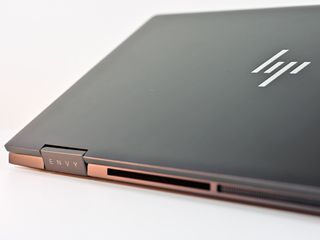
One word Cho kept returning to when talking about HP's sustainability approach was "holistic." In everything from packaging to product design, materials, and resource use, Cho emphasized HP tackles sustainability in a comprehensive way across the lifecycle of its products. But HP isn't only focused on moving its own goals forward; it views sustainability as a shared responsibility across the industry.
"Sustainability is a little bit different from other topics in our business where, you know, we think about competitive differentiation," Cho said. "On this one, it's like, kudos to the industry of moving forward. We're happy for [partners] to learn from us, and we're happy to learn from [them] because we want to move this as an industry."
As for where that leaves HP, and the rest of the tech industry, during the pandemic, Cho remained hopeful.
"There's never been anything in history where everyone in the world pretty much, you know, is going through some similar ramification," Cho said. "We realize how interconnected we are and then suddenly the topic of being sustainability minded and having to act on things short and midterm [is] again why I say [COVID] is a catalyst for that more."
Dan Thorp-Lancaster is the former Editor-in-Chief of Windows Central. He began working with Windows Central, Android Central, and iMore as a news writer in 2014 and is obsessed with tech of all sorts. You can follow Dan on Twitter @DthorpL and Instagram @heyitsdtl.

